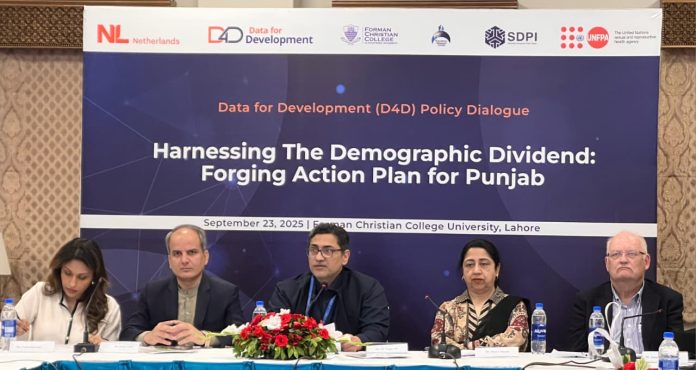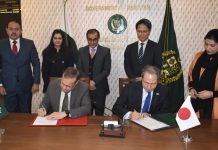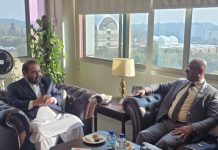By Ali Imran
ISLAMABAD: Policymakers, development practitioners, and civil society experts convened at Forman Christian College University (FCCU) for a high-level Data for Development (D4D) policy dialogue titled “Harnessing the Demographic Dividend:
Forging an Action Plan for Punjab.”
The dialogue was jointly organized by UNFPA, the Sustainable Development Policy Institute (SDPI), FCCU, with support from the Government of the Netherlands, said a press release on Tuesday.
The gathering brought together key stakeholders from the public sector, policymaking bodies, development partners, and academia. Its objective was to foster collaboration and gather critical input on UNFPA’s proposed Action Plan, ensuring its efficiency and local relevance.
The participants also discussed a road-map to align Punjab’s development strategies with this plan, aiming to fully capture the province’s demographic dividend and create a sustainable framework for long-term economic growth.
The meeting further encouraged multi-sector partnerships to accelerate policy reforms, underscoring the importance of collective ownership and shared responsibility in achieving lasting progress.
Nearly 60 percent of Pakistan’s population is under the age of 30, offering a rare window to boost economic prosperity.
Yet, persistent gaps in health, education, and job training threaten to turn this potential advantage into a challenge. Punjab, home to the nation’s largest working-age population at 58.3 percent, stands at the heart of this opportunity.
Experts at the dialogue emphasized that without decisive action, the demographic window — expected to close by 2050—could transform into a missed chance for national progress and sustainable development.
Masood Anwar, Chief Economist, Planning and Development Board, identified population growth, low literacy, unemployment, and inadequate infrastructure as core challenges.
“Results of planning do not come overnight. We must develop strong, long-term policies to control population growth and improve literacy. More schools, colleges, universities, and jobs are urgently needed,” he stressed.
Mahwish Sultana, MPA, highlighted the Punjab government’s commitment to youth welfare, noting that Chief Minister Maryam Nawaz Sharif has launched several projects to uplift young people, including the Honahar Scholarship. “Quality education, women’s welfare, and economic stability remain top priorities,” she said, citing new initiatives and legislation
for youth and women’s empowerment.
Speaking on the occasion, Tania Durrani of UNFPA emphasized the urgency of investing in youth. “Nearly 60 percent of Pakistan’s population is under 30, and Punjab holds the largest working-age share of its 127 million people. Without stronger investments in health, education, skills, and jobs, this opportunity could quickly become a demographic burden,” she said.
Highlighting UNFPA’s five-decade commitment to Pakistan, she detailed initiatives such as the Data for Development program, which strengthens data governance and supports Population Research Centers. “Reliable data is the backbone of smart decisions and accountability. But the clock is ticking,” she warned, urging progress toward Punjab’s population targets and expanded vocational training.
Dr. Durre Nayab, Lead author of Action Plan speaking at the event, highlighted the rapid rise in population, noting that Punjab’s population now makes up nearly half of Pakistan’s total. She emphasized that while the people of Pakistan possess immense potential, it must be nurtured especially among the youth to unlock national progress.
She stressed that the country’s fast-growing population demands the development of income opportunities and the expansion of essential resources. Quality education, robust health infrastructure, and access to clean drinking water, she added, are critical priorities.
Dr. Nayaab further underscored the importance of protecting labor rights, ensuring decent work conditions, allocating budgets fairly, and strengthening governance to meet future challenges.
Dr. Nizamuddin, Former Chairman HEC Punjab, urged the introduction of skill-based education, particularly in public universities, and the improvement of infrastructure in remote areas to make schools more accessible. Dr. Sajid, Deputy Executive Director at SDPI and Lead for the D4D Initiative, stressed the need for a comprehensive strategy to address youth issues and called for stronger support from parliamentarians and policymakers.
During an interactive question-and-answer session, participants discussed challenges facing Punjab’s youth and explored future strategies, receiving appreciation from attendees for their constructive insights.
The dialogue concluded with a strong consensus that Punjab’s demographic advantage can drive inclusive growth only through coordinated action in education, health, skill development, and employment generation. Stakeholders reaffirmed their commitment to work collectively with government institutions, development agencies, and academia to translate today’s discussions into measurable progress for the province and the nation, ensuring that the aspirations of young people are not only recognized but actively supported through concrete policies and well-funded programs.






